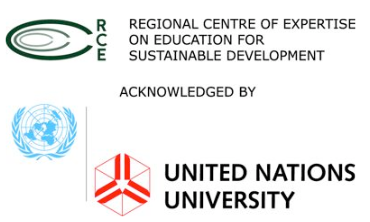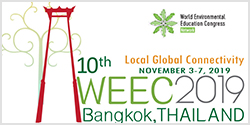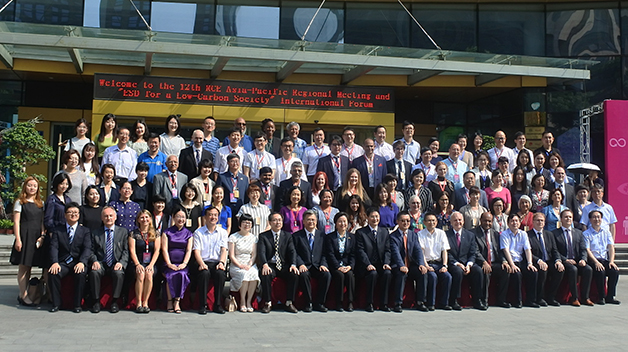
RCE Bulletin
Dear Colleagues and Friends,
Greetings from the Global RCE Service Centre!
The 12th Asia-Pacific Regional Meeting took place earlier this month in Hangzhou, China, and was a fantastic opportunity to gather to discuss action plans for the region and how to collaborate further. It was great to see so many RCEs at this event - thank you all for your active participation! Take a look at the report, content, and photos from the event under 'Latest News' below.
For other regions, there is still time to register for the RCE Regional Meetings taking place in 2019. The deadlines are as follows:
- 9th African Regional Meeting - deadline: 28 June, 2019
- Europe Regional Meeting 2019 - deadline: 13 August, 2019
- 8th Americas Regional Meeting - deadline: 23 August, 2019
For any news you would like to contribute to an upcoming bulletin, please complete this form and email your submission to the Global RCE Service Centre at rceservicecentre@unu.edu (submissions close on the 15th of each month).
Sincerely,
The Global RCE Service Centre
Upcoming Events
30 July, 2019, Yokohama, Japan
Registrations are currently open for the International Forum for Sustainable Asia and the Pacific (ISAP) 2019, to be held 30-31 July, 2019, at Pacifico Yokohama, Japan, under the theme 'Inclusive Transformation: Multi-stakeholder Collaboration Driving the World Towards a Circulating and Ecological Economy'.
Organised by the Institute for Global Environmental Strategies (IGES) and the United Nations University Institute for the Advanced Study of Sustainability (UNU-IAS), this year's forum will feature an ESD session presented by the UNU-IAS ESD Project: 'Next Step of ESD for Achieving the SDGs', to be held on 30 July from 15:00-16:30.
This session will discuss the next steps for ESD to achieve the SDGs with key experts from around the world. The keynote speaker will address and discuss a conceptual framework on ESD for post-GAP and the SDGs, followed by a panel discussion on UN/International frameworks to provide both regional and international perspectives.
The deadline for registrations is 16 July, 2019. To register, complete the online form here.

3-7 November, 2019, Bangkok, Thailand
The World Environmental Education Congress (WEEC) is an international congress addressing education for environment and sustainability. For the first time, WEEC will be held in Asia. The theme for this 10th edition is 'Local Knowledge, Communication and Global Connectivity', with the goal of enhancing local knowledge within the global spotlight in terms of environmental education. Registration is currently open - for further details, please visit the congress website here.
26-29 August, 2019, Pokhara, Nepal
Run by Systainability Asia, Thailand, Adhhyeta International, Nepal, and the Institute of Professional Training & Management (IPTM), Bangladesh, this international advanced level Training of Trainers programme will provide individuals with the knowledge, tools, methods, and network to effectively put into action the global goals at the national and sub-national level. The theme will focus on SDG 13: Climate Action. For more information, visit the website here.
Open Calls
UNU-IAS is currently accepting applications for its four-week UNU Intensive Core (UNU-IC) Courses at UNU Centre in Tokyo, Japan, from 2-27 September, 2019. The courses are designed to provide analyses of global issues from both theoretical and empirical perspectives, and draw on the research projects undertaken at UNU-IAS and at various other UNU institutes located worldwide. Although advanced in nature, they are open to postgraduate students and professionals in various occupations who are not necessarily specialists in the field. Details on the courses offered, requirements, and application procedure can be found here. The deadline for applications is 5 July, 2019.

(Photo source: UNESCO Bangkok)
The Plastic Initiative Award, developed by UNESCO Bangkok, is an opportunity for schools, universities, and other institutions to be recognised for their work related to plastic waste management. The winner will have their work presented at a Donor/Fundraising event, in addition to receiving a trophy and other prizes.
The Award will be complemented by the Plastic Initiative Photography Contest, with submitted photos to relate to the theme 'Beat Plastic Pollution'. The winner will receive a trophy and be given a platform to publicise their projects and contributions.
The application deadline for both initiatives is 31 July, 2019. Find out more here.

(Photo source: SEAMEO)
The Southeast Asian Ministers of Education Organization (SEAMEO) and the Ministry of Education, Culture, Sports, Science and Technology, Japan (MEXT) in cooperation with the UNESCO Asia and Pacific Regional Bureau for Education are pleased to announce the 2019 SEAMEO-Japan Education for Sustainable Development (ESD) Award, with the theme 'Building Peace in Schools and Communities'. The objectives of this year's award are:
- To raise awareness of ESD in schools and communities across Southeast Asia;
- To promote ESD best practices in schools and communities across Southeast Asia;
- To share and exchange knowledge and best practices on ESD in schools across Southeast Asia and Japan;
- To encourage networking among schools and communities which implement ESD practices in Southeast Asian countries and Japan; and
- To support the Sustainable Development Goals (SDGs) of the United Nations.
All public and private kindergarten/elementary/secondary/vocational and technical schools within 11 Southeast Asian countries are eligible to apply (Brunei Darussalam, Cambodia, Indonesia, Lao PDR, Malaysia, Myanmar, Philippines, Singapore, Thailand, Timor-Leste and Vietnam).
The school awarded 1st prize will receive USD 1500 and a study tour to Japan, with prizes of USD 1,000 and USD 500 for 2nd and 3rd prizes respectively. The deadline for submissions is 2 September, 2019. Further information and details on how to apply can be found here.
Since 2017, RCE Central Semenanjung, through its secretariat UM Community & Sustainability Centre (UMCares), have organised a 'DIY Made Simple' competition. The aim of this competition-based programme is to create awareness of how waste can be converted to useful products, by promoting product invention among school students and inspiring them to use unused materials to improve their school facilities by applying the do-it-yourself (DIY) concept.
New for 2019, an international category has been created for RCE members in the Asia-Pacific region, with two prizes to be awarded. Eligible RCEs are welcome to submit a video of any recycling and upcycling activities or programs being conducted in their country, particularly within schools.
Participation in this competition will encourage the exchange of knowledge and practices regarding the recycling of waste and upcycling of unused products or materials, and supports SDG 11 (Sustainable Cities and Communities) and SDG 12 (Responsible Consumption and Production). Submissions are currently being accepted, until 27 September, 2019. View the competition poster here, or visit the competition webpage here for more information.
Universitas Gadjah Mada (RCE Yogyakarta) are currently accepting registrations for their 2019 Summer Course programs. Topics include 'Tropical Biodiversity and Sustainable Development', 'Smart Integrated Farming for Sustainable Agriculture', and 'Integrated Food Security in ASEAN', among others. Take a look at the flyer for a list of the courses and dates on offer.
Registrations are accepted through UGM's Student Admission System here.
Latest News

Over 100 participants from across the Asia-Pacific region attended the 12th Asia-Pacific RCE Regional Meeting earlier this month in Hangzhou, China from 4-6 June, 2019 - the first RCE Regional Meeting held in China.
The event included a Symposium on 'Enabling a Low-Carbon Society through Education for Sustainable Development (ESD)' on 5th June, followed by thematic workshops and a field trip on 6th June. It was held in conjunction with side events and SDGs shows.
The meeting aimed to strengthen inter-RCE collaboration through showcasing successful cases in ESD in the context of the SDGs and the GAP. Discussions in some sessions produced possible future collaborations among RCEs, including mutual learning on low carbon and the expansion of Youth Challenges on Sustainable Development and joint strategies on integrating SDGs into curriculum at universities within RCEs in the region. Read a report of the event here.
The Global RCE Service Centre wishes to thank the team at RCE Hangzhou for their wonderful support and efforts in making this event a success.
RCE Greater Nairobi held their annual stakeholders' meeting on 16 April, 2019, at Panari Hotel, Nairobi, with more than 30 participants from various organisations in attendance. The aim was to bring stakeholders together to share their activities towards achieving sustainable development, the challenges experienced, and best practices to overcome these challenges and enhance education for sustainable development. Read a report of the event here.
ESD BOOKS, PUBLICATIONS AND OTHER

This report analyses Sustainable Development Goals (SDGs) trends as well as data availability for monitoring progress in Asia and the Pacific and its five subregions. It assesses progress towards the SDGs and the gaps which must be closed for these to be achieved by 2030. It finds that although progress has been made towards some SDGs in the region, the rate of progress has been insufficient and needs to be accelerated. The report is an invaluable resource for all stakeholders involved in prioritisation, planning, implementation and follow-up of the 2030 Agenda for Sustainable Development in Asia and the Pacific. Read the full report here.

This report, prepared as the theme study for the 75th Session of the Economic and Social Commission for Asia and the Pacific, looks at recent progress towards equality in three key areas of socioeconomic development: education, full-time employment, and income. Covering the past 10 years, it assesses whether women, rural populations, persons with disabilities and other disadvantaged groups have fallen further behind, been included in overall national development gains, or have been empowered to catch up with outcome levels of more privileged groups. Read the full report here.
This article, published under the North American Association for Environmental Education's eeWORKS program, covers research conducted by Stanford University on the benefits of environmental education (EE) for K-12 students. The researchers analysed 119 peer-reviewed studies published over a 20-year period to measure the impact of EE, and its contribution to outcomes for K-12 students. Read more
Published on the place website, which features reportage produced by the Thomson Reuters Foundation, this article speaks about the importance of cities shifting to a circular economy. Read more
This article, featured on the CNN website, notes how developed areas can also serve as habitats for species fleeing due to climate change: "For conservationists trying to provide safe routes for animals to move from one habitat to another, our cities could provide a vital stepping stone on their journey...", writes Mark Tutton. Read more
Featured on The Better India website, this article covers the story of Akshar School, a school which is breaking the conventional ideas of education. "[Akshar] now has over 100 kids between the ages of 4 to 15 years studying to change the future of the community. Each child brings in at least 25 items of plastic waste per week, as their contribution to their community and the environment", writes Ananya Barua. Read more
This article, featured on the Brookings website, introduces three recent publications which present current trends in development, as well as approaches on how it can be improved. Read more
Also featured on the Brookings website, this article looks at playful learning landscapes and how this can bring people together, strengthen communities, and provide engaging learning opportunities for children's development. Read more
For two years, the city of Windhoek, in Namibia, has participated in the Future Resilience for African CiTies and Lands (FRACTAL) project, of which the Stockholm Environment Institute (SEI) plays a key role. SEI's work with partners underpins the development of the city's first integrated climate change strategy and action plan, and provides a model for other African cities. Read more


